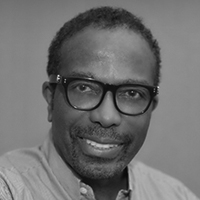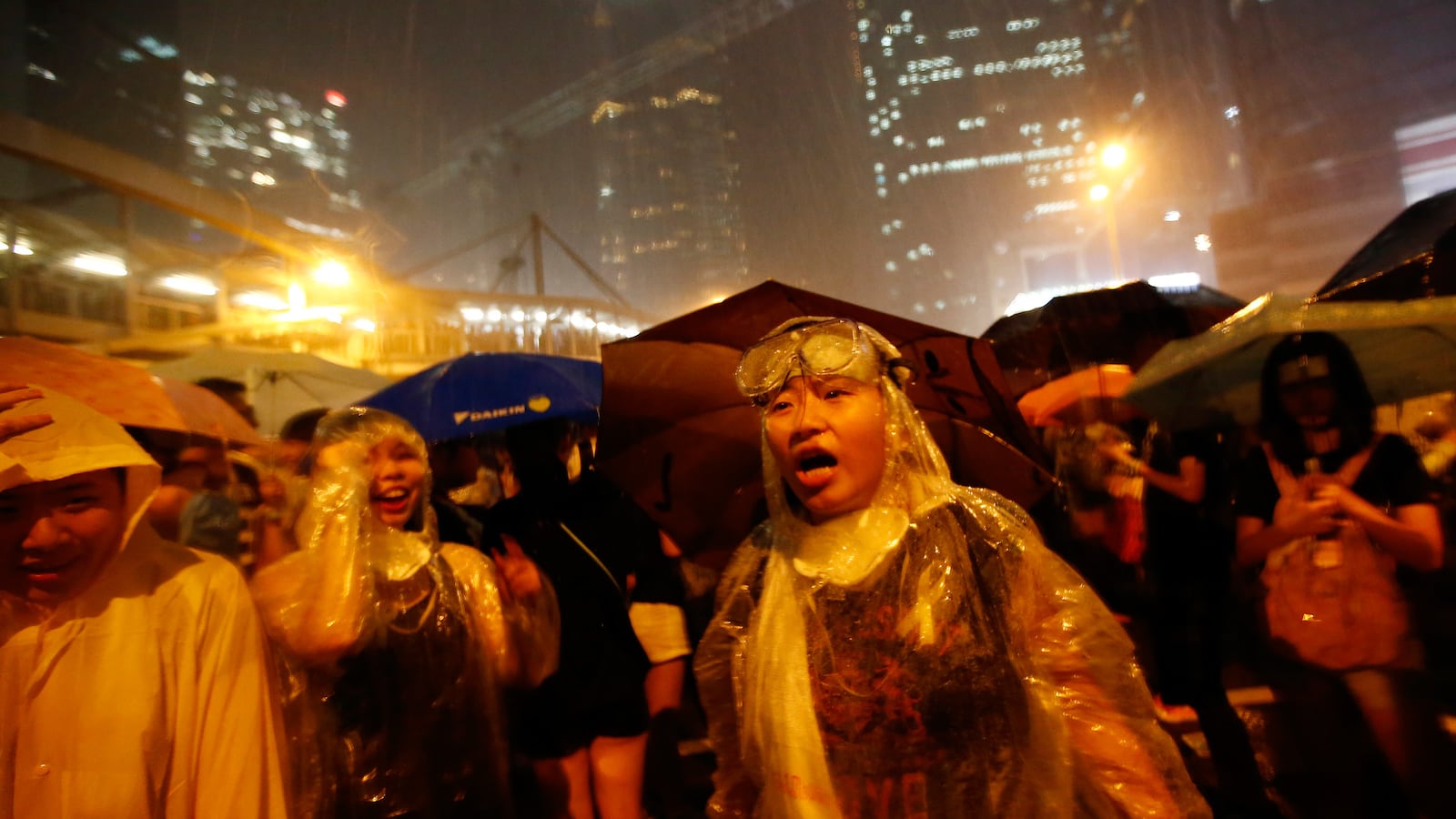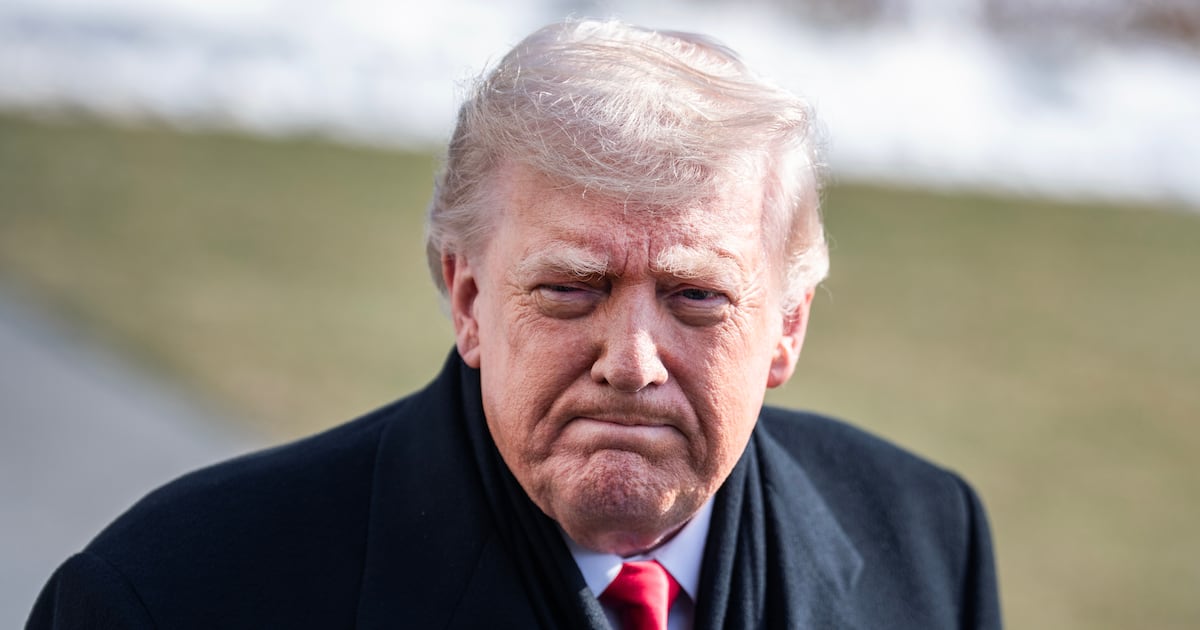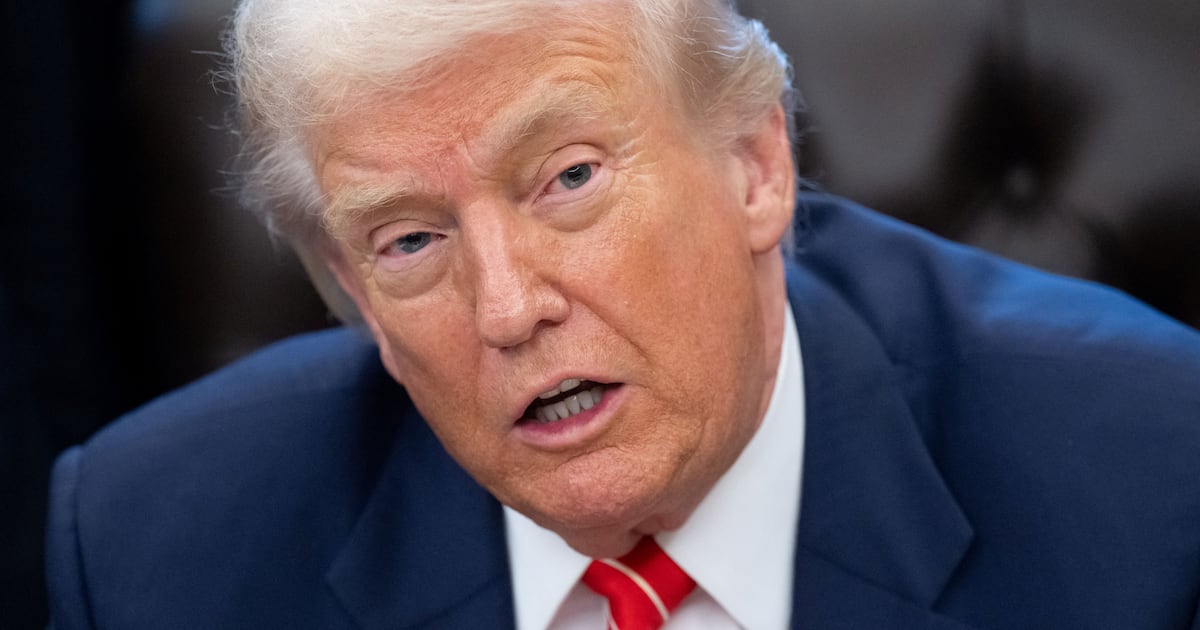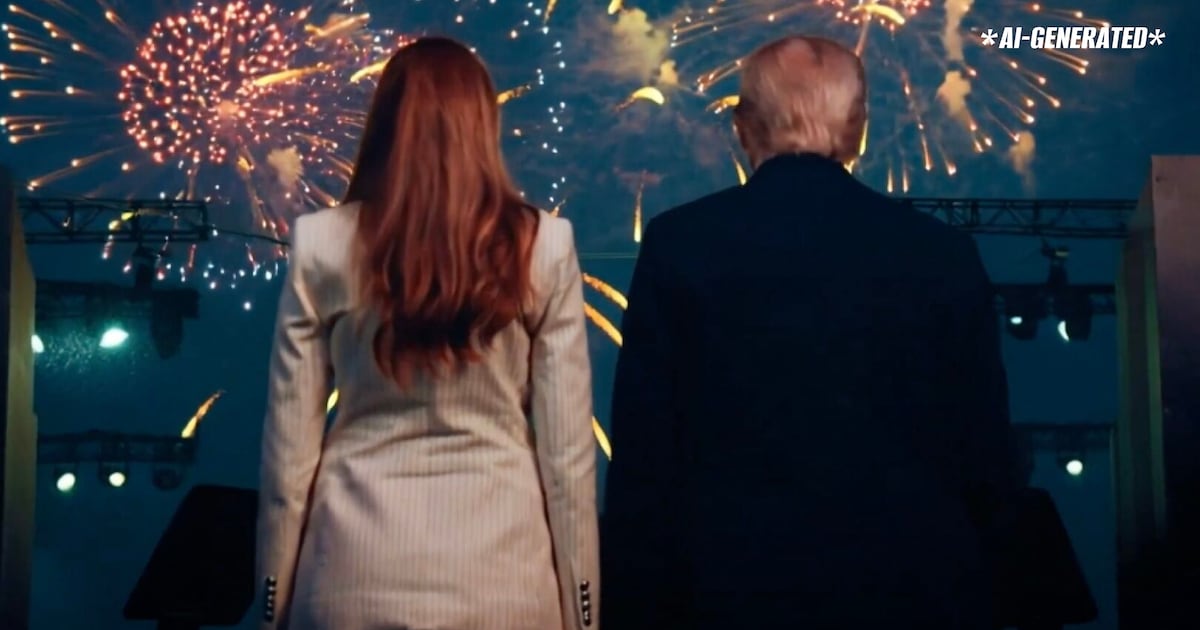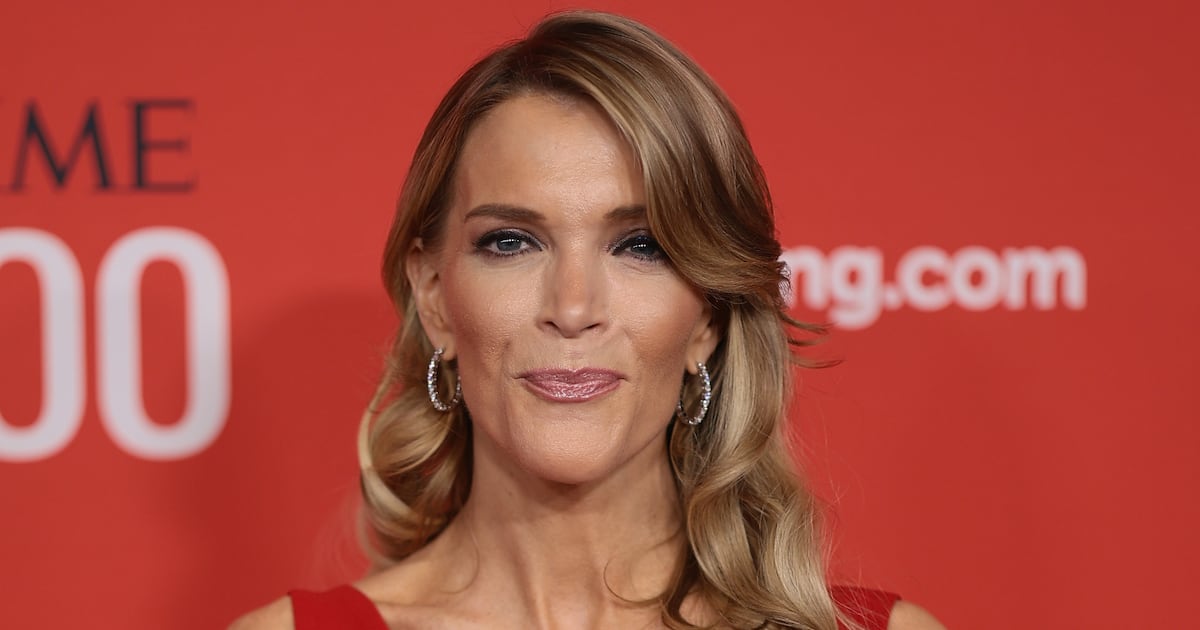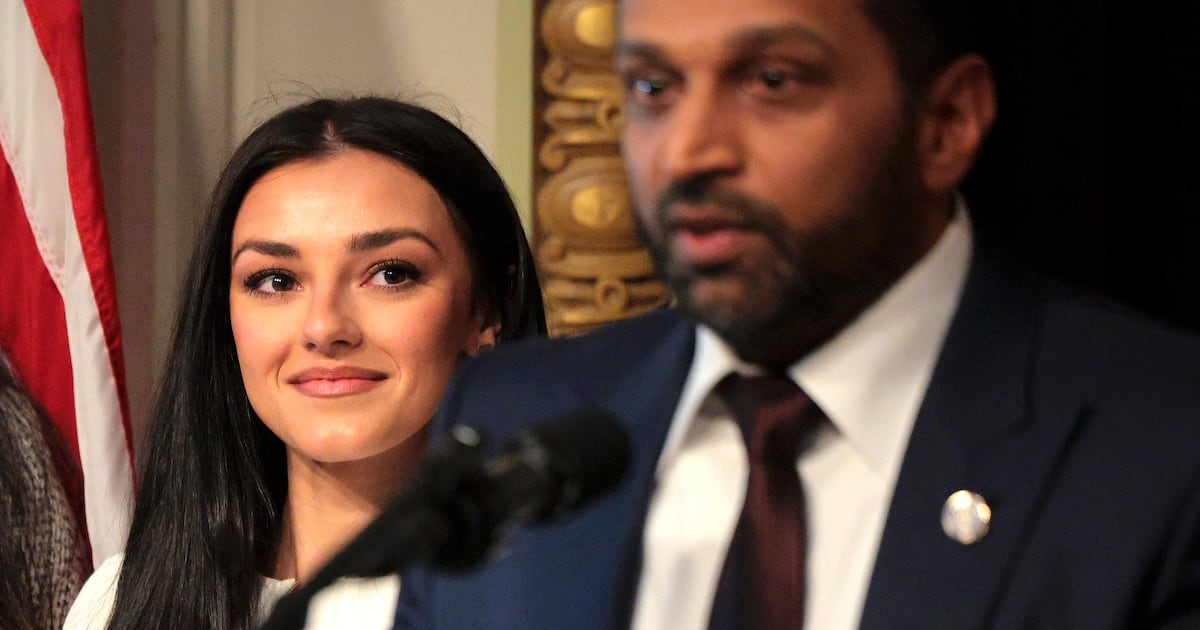Protesters in Hong Kong launched another day of demonstrations Tuesday with every indication they have lost little of their zeal for democracy—and every signal that China has no intention of caving to their demands for full universal suffrage. “The central government will not change its mind as a result of such tactics,” Hong Kong’s chief executive, Leung Chun-Ying, said Tuesday morning in his first public comments on the unrest.
After flatly rejecting calls to resign, the chief executive, also known as CY Leung, laid down Beijing’s hardline position, telling Occupy Central demonstrators to “stop this campaign immediately.” Virtually no one was surprised, because Leung is Beijing’s man “when it comes to political reforms; in terms of politics,” Hong Kong political analyst Alex K. Lo tells The Daily Beast. “Beijing has spelled out what you’re going to get and you have to fall in line. The government, the establishment legislators and big business tycoons are falling in line.”
Tuesday started quietly enough, with fewer protesters than the day before, as residents went to work on Hong Kong Island and across the harbor in Kowloon—showing the industriousness that has helped make the city a global business and financial hub. Protesters even spent time in the morning cleaning litter from streets in the Causeway Bay shopping haven, unsurprising in a confrontation that has been mostly polite.
Violence seeped into the protests only when police tear-gassed students on Sunday, which failed to disperse the crowd, but did cause dozens of injuries and almost 100 arrests. The teargas episode shocked many in the city, and was criticized as excessive even by government supporters, who believed the crowd’s peaceful demeanor did not warrant such a response.
Leung, however, has criticized Occupy Central for allowing the protests to spiral out of control. Central is the city’s financial center, and home to most international corporations and consulates. Chin Kin-Man, a protest organizer, denied Leung’s accusation, insisting that it’s the government that has lost control—a reference to the use of tear gas. "We don't see the need to stop the movement. Stopping it is in the hands of the government; it's up to the government to listen to the people,” Chin said.
But Leung has a point. The pro-democracy crowd has expanded from students to include trade unionists, social workers, teachers, and even some business executives. And there appears to be no one leader or slate of leaders ramrodding the protests. The mass uprising is characterized by impromptu gatherings that occur in Central, Admiralty, Wanchai, and Causeway Bay, as well as in Kowloon’s Mongkok district.
“In a sense, the masses are not organized,” says Lo, who is with the South China Morning Post. “It’s very spontaneous. You can say it is a sign of wide discontent. But where do you go from here when you have all these young people with certain beliefs but who don’t have an articulated political agenda? There’s a sense of unity—singing songs and having a festive atmosphere. It’s something like Woodstock, but how do you articulate that political position?”
Photos: Hong Kong Erupts in Protests

As temperatures soared beyond 88 degrees Tuesday, classes in Wanchai, Central and Western district schools were canceled and the government urged other districts to “exercise flexibility” with students. A number of bus routes were suspended or altered. And Police Commissioner Andy Tsang Wai-hung, a hardliner, emailed officers in the early hours exhorting them to “stay united, remain resolute, and overcome this challenging situation together,” according to the South China Morning Post. By afternoon, the number of protesters in Mongkok had grown to about 1,000 and in Causeway Bay to twice that. At one point, a group calling itself the Alliance in Support of Our Police Force chanted slogans outside police headquarters in Wanchai, and some accused demonstrators of “inconveniencing” the bustling city, the Post reported.
Throughout the standoff, Beijing has tried to keep a low profile, leaving Hong Kong proxies such as Leung and Tsang to communicate—and enforce—the central government’s position. The administration of President Xi Jinping has tried to behave as if the Hong Kong imbroglio is a local matter to be resolved locally. But events in the Special Administrative Region are enormously important to the Communist Party leadership in Beijing. When Britain handed over Hong Kong in 1997, the Chinese agreed to give the territory 50 years of “a high degree of autonomy” as part of a “one country, two systems” arrangement. Basic rights included freedom of speech and the right to protest.
That Anglo-Chinese agreement almost by definition set the former colony on a collision course with Beijing, where “one-man, one-vote” is anathema.
China will not countenance an administrative region that is for all intents and purposes democratic while the rest of the country is tightly controlled. What if the impetus for democracy spreads to the Mainland?
Related: Hong Kong Protesters Fear Martial Law Is Next
Beijing has gone to great lengths to prevent Hong Kong news from circulating on the Mainland. News coverage is tightly controlled. The government-run China Daily struck an aggrieved, exasperated tone in the single story it ran on its web homepage today, accusing protesters of disrupting “the daily lives of many people in Hong Kong” and trying to “coerce the central and Hong Kong governments to accept their demands.”
Social media is heavily censored, with Instagram blocked and access to various websites operating at a crawl. The hugely popular website Weibo, a hybrid of Twitter and Facebook, was blocked. It later reopened, but some search terms, such as “Central” and “Hong Kong students,” either were not functioning or were being censored.
Many Hongkongers worry that Xi Jinping, a hardliner on virtually every China-related issue including sovereignty in the South China Sea, will get fed up and unleash soldiers from the People’s Liberation Army, which maintains a garrison in the city’s Admiralty district, in a replay of Tiananmen Square. But such a move appears unlikely. Xi and his inner circle prefer to keep the Hong Kong protests a domestic matter, and have no desire to draw international condemnation by staging a crackdown in which citizens might be killed. Sensitive about foreign pressure, China spokeswoman Hua Chunying warned against outside interference this week—likely in response to the United States and United Kingdom calling for freedom of expression in the ex-colony.
“There is no reason to think Xi will take a less tough line on this than he has on anything else,” says Lo. “There’s very little other people, other countries, can do.”
Ironically, the very decision that has so riled the masses—Beijing’s refusal to allow open nominations for chief executive—contains reform that appeals to pro-democracy protesters. It allows full suffrage on the election itself. Currently, an election “committee” consisting of 1,200 Hongkongers votes for the chief executive. The new proposal from Beijing requires a majority vote by the Hong Kong Legislature to go into effect. Of those 70 lawmakers, 27 are from pro-democracy parties. If all 27 vote against the proposal, the territory falls back to the current system—meaning any version of one-man, one-vote will be scuppered. “Any personnel change before the implementation of universal suffrage is achieved would only allow Hong Kong to continue to pick its leader under the Election Committee model,” warned CY Leung.
Beijing knows, as Alex Lo put it, “that it holds all the cards.”
Related: Is Hong Kong Tiananmen 2.0?
A test for both protesters and authorities may come Wednesday, when most businesses will close to mark Chinese National Day. The holiday may see more Hongkongers hit the streets, which in turn could provoke the authorities to take more-draconian measures. The prognosis is that PLA troops will remain garrisoned and that police officers will continue to face off with protesters. The city’s police force is very well-equipped and can handle even a protracted season of protests. How long those protests can continue is anyone’s guess. The likelihood is that eruptions will ebb and flow and perhaps drag on for weeks—unless the two sides reach some kind of accommodation.
Lo thinks the local government should designate one or two protest sites and leave the demonstrators alone. “One reason for the confrontations is that the protesters were kicked out of government sites such as Civic Square—which are the kind of place for such activity,” Lo says. “Maybe the government should let the protesters stay somewhere, as long as they want, and try to have a dialogue.”
